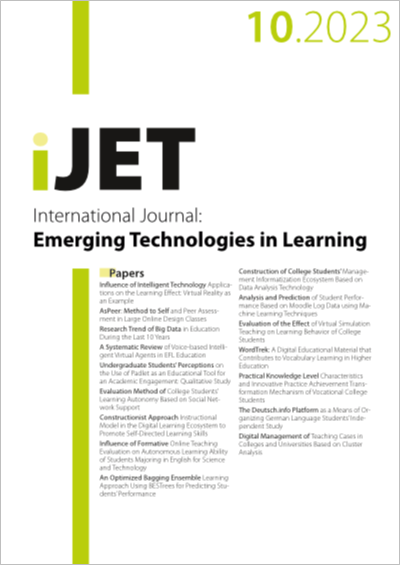A Systematic Review of Voice-based Intelligent Virtual Agents in EFL Education
DOI:
https://doi.org/10.3991/ijet.v18i10.37723Keywords:
intelligent virtual agents, EFL, L2 education,Abstract
Since its debut in the field of education nearly three decades ago, Artificial Intelligence (AI) has been considered as a powerful tool to facilitate new paradigms for instructional design and innovative educational practice in the form of intelligent tutoring systems, chatbots, teaching robots and adaptive learning systems among others. Recent technological advances in the adjacent areas of natural language processing, machine learning and computer graphics focusing primarily on design features that can improve their human-like qualities of naturalness and believability as human interlocutors have also amplified new application opportunities for Intelligent Virtual Agents (IVAs) or Animated Pedagogical Agents (APAs) within the area of Intelligent Computer-Assisted Language Learning (ICALL). Although AI-powered IVAs hold the potential to enhance the learning process in nearly any knowledge domain and personalize automation in teaching by embodying different roles in the learning environment, strikingly few studies have empirically attempted to assess IVAs impact on L2 learners’ academic achievement when learning English as a Foreign (EFL) so far. This study addresses this issue via a systematic review of relevant interventionist IVA studies that were conducted in EFL settings and published within the 2015-2020 timeframe examining IVAs key affordances, major barriers in their adoption for language learning purposes, and the CALL research trends currently prevalent on the topic. Pedagogical implications for the effective implementation of IVA technology in L2 contexts are discussed and future research avenues in the area are highlighted.
Downloads
Published
How to Cite
Issue
Section
License
Copyright (c) 2023 Eirene Katsarou

This work is licensed under a Creative Commons Attribution 4.0 International License.



